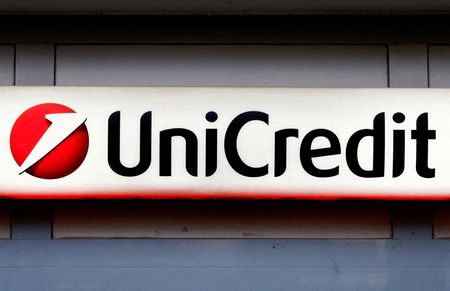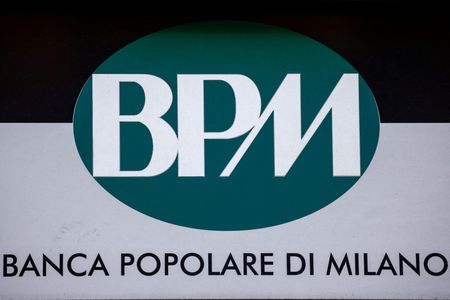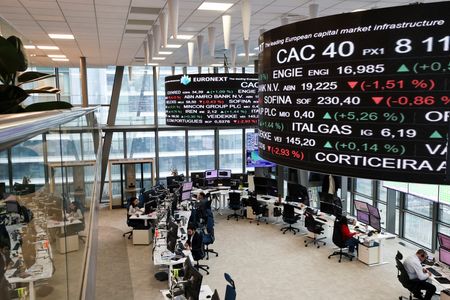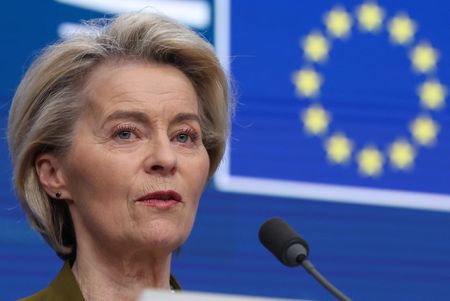By Valentina Za
MILAN (Reuters) – Credit Agricole got the all clear to take a bigger stake in Italy’s Banco BPM, posing a hurdle to UniCredit which said on Wednesday it would launch its 14 billion euro ($15 billion) tender offer for BPM on April 28.
UniCredit’s takeover offer is one of a series of hostile bids shaking up Italy’s banking sector, which has rebuilt capital reserves from record profits fuelled by high interest rates, after a bad loan clean-up.
Italy’s second-biggest bank said its tender offer, cleared by market watchdog Consob, will run until June 23. Credit Agricole said the European Central Bank had cleared its 19.8% stake in Banco BPM.
The French bank has key commercial interests to protect in Italy, its biggest foreign market, where multi-year commercial deals bring in fees.
When announcing the Banco BPM bid, UniCredit CEO Andrea Orcel invited BPM’s investors to talks, saying solutions of mutual satisfaction could be worked out. But buyout regulation requires equal treatment for all shareholders.
Orcel has bargaining power in a distribution deal between UniCredit and Credit Agricole’s fund manager Amundi, which ends in 2027.
Orcel, who has been rebuilding in-house fund skills and trimming the proportion of Amundi funds it sells, has not ruled out ending rather than renewing the deal which was signed when Amundi bought UniCredit’s fund business for 3.6 billion euros.
Shares in Amundi fell 6.9% on Wednesday, their biggest daily drop since 2020, highlighting that investors are worried about the implications of what sources described as difficult negotiations between UniCredit and Credit Agricole.
Orcel in February said the situation with Credit Agricole “is what it is”, adding that he hoped to resume talks near the launch of the BPM offer.
Credit Agricole also has consumer finance and non-life insurance partnerships with Banco BPM, which it is keen to keep going.
DEFENCE STRATEGY
Credit Agricole became Banco BPM’s main investor in 2022, acquiring 9.2% shortly after an earlier failed takeover plan by UniCredit.
The French bank has managed to keep Italy’s government on side, with a non-aggressive expansion strategy, and stepping in to buy failing lenders in 2017.
Orcel’s swoop on BPM in November upended the Italian Treasury’s plans to promote an eventual tie-up between Banco BPM and state-backed Monte dei Paschi di Siena.
Buttressing BPM’s defences against UniCredit, Credit Agricole bought derivatives in December to raise its holding after an informal nod from the Rome government. It bought further derivatives in the first quarter, it said, reiterating that it will not bid for the whole of BPM.
UniCredit has said its BPM bid is “autonomous and independent” of its ambition to tie up with Germany’s Commerzbank.
Orcel has bought 28% of Commerzbank and wants to discuss a potential acquisition with Berlin’s new government, though he has pushed back any deal to 2026 or even 2027.
Orcel also has 4.2% of Italian insurer Generali and could weigh in at an April 24 shareholder vote to elect a new board, before the finalisation of a landmark asset management deal.
With interest rates declining, asset management has become crucial for bank revenues. Just before UniCredit’s offer, Banco BPM had bid for Italian asset manager Anima Holding.
To secure that deal, Banco BPM got shareholder approval to raise the price and proceed even without capital benefits which the ECB could have granted.
These decisions give UniCredit the right to drop the BPM bid. UniCredit said it has until 0529 GMT on June 30 to waive the conditions linked to Anima.
After the loss of the capital benefits, which has weighed on BPM shares, the discount of UniCredit’s offer to Banco BPM’s market value has halved to 500 million euros.
($1 = 0.9260 euros)
(Additional reporting by Andrea Mandala in Milan; Editing by Louise Heavens, Elaine Hardcastle and Jane Merriman)











